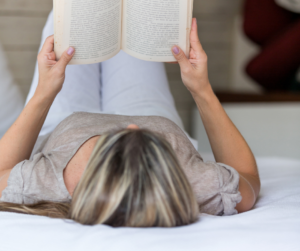In Part 1 of the sleep series, we talked about the importance of sleep and how to start making sure you get enough. (If you missed it, see that post here) Part 2 is all about setting you up for longer, better sleep with your perfect wind down routine. Let’s get started:
Creating Your Pre-Game Sleep Routine
Now that you’ve determined your ideal bedtime for enough sleep, we’re adding the next building block to better sleep. And you’ll love it — it’s even fun! I call it your Pre-Game Sleep Routine.
Why “pre-game”, you might ask?
Imagine you’re about to walk into a game or athletic event. I’m willing to bet you wouldn’t show up without your gear in tiptop shape, shoelaces tied, your system fully hydrated…. right? So in the same way, let’s think about the time leading up to bed as your pre-game time for sleep.
While this might sound cheesy, it’s really true that the better you prepare for your sleep game, the better chance you’ll have at scoring better sleep!
So, now the question is: what does a pre-game sleep routine look like? I’ve broken it down into 2 EASY steps:
#1 Set Your Pre-Sleep Activities
Think about the last things you currently do in your day, leading up to bed.
Now, think about what types of activities will really set you up for a restful night of sleep.
I’ve seen many simple and easy activities work wonders for many of my clients. Some examples include:
- Taking a nice bath
- Changing into PJs you love
- Brushing your teeth
- Dimming the lights in your home
- Putting on a calm and soothing playlist
- Reaching for something relaxing to read
- Writing in a journal
- Doing a quick body scan meditation
- Using a scented oil diffuser or calming scented candle
- NOT using your computer, TV, or smartphone (put them in another room if you have to!)
Of course, these are just examples. Think about what helps you personally wind down from your day.
Now, write out your own pre-sleep routine. Outline all the stuff that will help you get ready for slumber, whether you do it regularly right now or not. Plan to focus on these activities at least 1-2 hours before bed.

#2 Be Mindful of What You Consume
Believe it or not, food can greatly affect your ability to have a good night’s rest. Think about it like this: your stomach is a muscle. After you eat, this muscle works hard to digest the food you eat and absorb the nutrients from it into your bloodstream.
Basically, eating kickstarts the activity of your stomach and digestive system — something you don’t necessarily want to be doing right before you’re needing to relax and go to sleep! The time it takes for food to digest totally differs based on its type, but in general, it’s best to eat around 3-4 hours before bed.
So here’s the second part of your pre-game sleep plan: consciously noting what and when your last meal is going to be.
So, like we did with determining your bedtime in Part 1, think about the time you want to be asleep, then work backwards. For example, if you’d like be asleep by 10:00 p.m each night, you’d want to have your last meal or snack by 7 p.m. or earlier.

Avoid Stimulants Too!
Watching what you eat before bed is important, but don’t forget about beverages too! Coffees and (non-herbal) teas contain caffeine that stimulates your nervous system and can cause issues with falling asleep. Even if you are able to fall asleep after consuming caffeine, it doesn’t guarantee you’ll get restful sleep. That’s because caffeine stays in your system a long time after you consume it; it has a half-life of 3-5 hours, which means that’s how long it takes for your body to get rid of just half of it.
So if you like your cup of coffee in the morning, that’s fine. But try cutting off all caffeine at least 5-6 hours before bedtime. Use the same technique with food to determine when that is for you.
Ensuring restful sleep is one of the best things you can do for yourself and your health goals. Try setting up your own pre-sleep game plan today. I know you’ll thank yourself for it!




